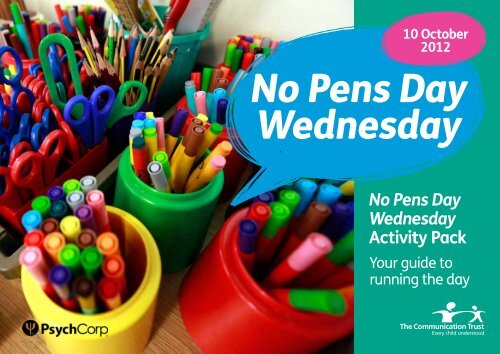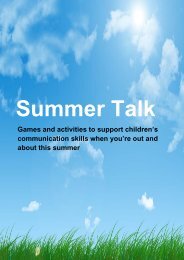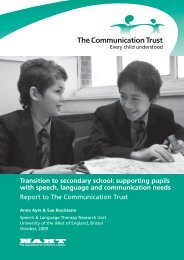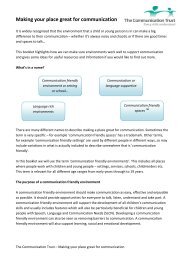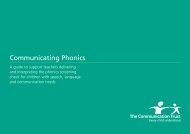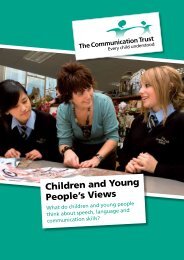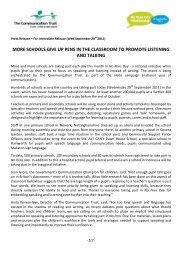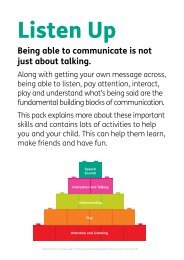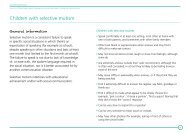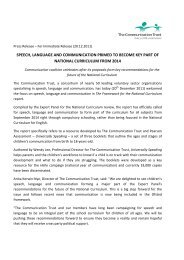No Pens Day Wednesday - The Communication Trust
No Pens Day Wednesday - The Communication Trust
No Pens Day Wednesday - The Communication Trust
Create successful ePaper yourself
Turn your PDF publications into a flip-book with our unique Google optimized e-Paper software.
10 October<br />
2012<br />
<strong>No</strong> <strong>Pens</strong> <strong>Day</strong><br />
<strong>Wednesday</strong><br />
<strong>No</strong> <strong>Pens</strong> <strong>Day</strong><br />
<strong>Wednesday</strong><br />
Activity Pack<br />
Your guide to<br />
running the day
Welcome to your<br />
<strong>No</strong> <strong>Pens</strong> <strong>Day</strong> <strong>Wednesday</strong><br />
activity pack<br />
<strong>No</strong> <strong>Pens</strong> <strong>Day</strong><br />
<strong>Wednesday</strong><br />
10 October<br />
2012<br />
<strong>No</strong> <strong>Pens</strong> <strong>Day</strong> <strong>Wednesday</strong> encourages schools to put down<br />
their pens and pick up their language by spending one day<br />
focusing on learning through speaking and listening.<br />
Thank you for signing up and getting involved.<br />
Contents<br />
All about <strong>No</strong> <strong>Pens</strong> <strong>Day</strong> <strong>Wednesday</strong>______________ page 3<br />
How to make classroom talk more effective______ page 6<br />
Getting ready for the day______________________ page 9<br />
How to run your <strong>No</strong> <strong>Pens</strong> <strong>Day</strong> <strong>Wednesday</strong>_______ page 10<br />
Outcomes__________________________________ page 13<br />
Spread the word_____________________________ page 14<br />
Next steps __________________________________ page 16
Teachers’ Activity Pack<br />
All about <strong>No</strong> <strong>Pens</strong> <strong>Day</strong> <strong>Wednesday</strong><br />
<strong>No</strong> <strong>Pens</strong> <strong>Day</strong><br />
<strong>Wednesday</strong><br />
10 October<br />
2012<br />
<strong>No</strong> <strong>Pens</strong> <strong>Day</strong> <strong>Wednesday</strong>,<br />
supported by Pearson Assessment,<br />
is a national speaking and<br />
listening event organised by<br />
<strong>The</strong> <strong>Communication</strong> <strong>Trust</strong>. <strong>The</strong><br />
<strong>Trust</strong> is a coalition of nearly 50<br />
voluntary organisations with<br />
expertise in speech, language and<br />
communication, who support the<br />
children’s workforce to develop the<br />
skills of the children they work with.<br />
Ofsted are increasingly highlighting<br />
the importance of speaking and<br />
listening for good teaching and<br />
attainment and as a common<br />
denominator in the most<br />
successful schools.<br />
In its second year, <strong>No</strong> <strong>Pens</strong><br />
<strong>Day</strong> <strong>Wednesday</strong> was originally<br />
developed for the Hello campaign<br />
(national year of communication).<br />
Hello sought to make children’s<br />
communication development<br />
a priority in homes and schools<br />
across the country and had a<br />
special focus on identifying and<br />
supporting those with speech,<br />
language and communication<br />
needs (SLCN).<br />
‘Schools which ‘turn the dial’ on<br />
language and communication are<br />
able to ‘turn the dial’ on a number of<br />
key school improvement priorities,<br />
from raising attainment to narrowing<br />
the gap and improving behaviour’.<br />
Jean Gross, <strong>Communication</strong><br />
Champion (2011)<br />
<strong>The</strong> aim of the day is to see a<br />
positive impact on all pupils and<br />
enable speaking and listening to<br />
be used as a vehicle for learning<br />
across the curriculum.<br />
Just a note... If <strong>Wednesday</strong> 10th<br />
October doesn’t work for your<br />
school, you can run your <strong>No</strong> <strong>Pens</strong><br />
<strong>Day</strong> at any time and still use the<br />
resources on our website.<br />
3
Teacher’s Activity Pack<br />
Why run a <strong>No</strong> <strong>Pens</strong> <strong>Day</strong> <strong>Wednesday</strong>?<br />
<strong>No</strong> <strong>Pens</strong> <strong>Day</strong><br />
<strong>Wednesday</strong><br />
10 October<br />
2012<br />
Because communication<br />
skills are part of national<br />
policy<br />
In the last 12 months, the<br />
importance of communication<br />
skills has been highlighted in<br />
a number of national policy<br />
documents:<br />
<strong>The</strong> Teachers’ Standards<br />
which will come into effect on<br />
1st September 2012, require<br />
teachers to ‘demonstrate an<br />
understanding of and take<br />
responsibility for promoting<br />
high standards of articulacy’<br />
In December 2011, the<br />
Expert Panel for the National<br />
Curriculum review called<br />
for spoken language to be<br />
included in the Curriculum for<br />
all subjects and throughout<br />
compulsory education<br />
And importantly, for the<br />
first time in January 2012,<br />
‘communication skills’ became<br />
part of the Ofsted Framework<br />
both in quality of teaching and<br />
in pupil achievement<br />
4
Teacher’s Activity Pack<br />
Why run a <strong>No</strong> <strong>Pens</strong> <strong>Day</strong> <strong>Wednesday</strong>?<br />
<strong>No</strong> <strong>Pens</strong> <strong>Day</strong><br />
<strong>Wednesday</strong><br />
28 September<br />
2011<br />
Because the schools who<br />
did it last year loved it...<br />
‘Children’s confidence in<br />
communication grew as a result<br />
of <strong>No</strong> <strong>Pens</strong> <strong>Day</strong> <strong>Wednesday</strong>. <strong>The</strong><br />
day culminated in a debate<br />
where children spoke sensitively<br />
and respectfully, listened well<br />
and showed excellent all-round<br />
communication skills’<br />
‘Thanks for the wonderful<br />
resource bank, lesson plans<br />
and assembly plans which<br />
made the day so much easier<br />
to participate in’<br />
‘<strong>The</strong> buzz in the staffroom was<br />
such that I suspect we will be<br />
instituting a <strong>No</strong> <strong>Pens</strong> <strong>Day</strong> at<br />
least termly!’<br />
‘<strong>No</strong> <strong>Pens</strong> <strong>Day</strong> <strong>Wednesday</strong> was great.<br />
It was particularly rewarding to see<br />
children who frequently struggled with<br />
the written word totally animated<br />
and engaged when forming crisp and<br />
concise sentences that elevated the<br />
level of sentence structure’<br />
‘<strong>The</strong> lesson plans on the website<br />
were excellent springboards for<br />
getting teachers engaged and<br />
sparking their ideas to build lesson<br />
plans of their own’<br />
5
Teachers’ Activity Pack<br />
How to make classroom talk more effective<br />
<strong>No</strong> <strong>Pens</strong> <strong>Day</strong><br />
<strong>Wednesday</strong><br />
10 October<br />
2012<br />
Talk is at the heart of education<br />
- teachers use talk as the main<br />
tool of their trade. <strong>The</strong> amount<br />
and quality of talk that children<br />
experience in the early years is a<br />
good predictor of how well they’ll<br />
do in school.<br />
And we now know that teaching<br />
children and young people how<br />
to use talk to think together can<br />
improve their commitment to<br />
learning and to their educational<br />
attainment. Key components<br />
of communication, such as a<br />
good vocabulary, can make a big<br />
difference to a child’s achievement.<br />
<strong>No</strong> <strong>Pens</strong> <strong>Day</strong> <strong>Wednesday</strong> will enable<br />
teachers to give pupils opportunities<br />
throughout the day to develop their<br />
communication skills and use them<br />
to support their learning.<br />
We know from a range of research<br />
that pupils are more likely to get<br />
enthusiastically involved in their<br />
education, and learn best from it,<br />
when teachers support and enable<br />
effective use of speaking and<br />
listening to support learning. And<br />
don’t forget - no pens means no<br />
marking!<br />
We have therefore suggested<br />
the following ten key principles<br />
for effective use of speaking and<br />
listening.<br />
>><br />
‘Spoken language is central to<br />
learning, culture and life, and<br />
is much more prominent in the<br />
curricula of many other countries.’<br />
Cambridge Primary Review<br />
...‘recent research shows that<br />
the average length of a pupil’s<br />
contribution to a class discussion<br />
is just four words’<br />
National Literacy <strong>Trust</strong>, 2011<br />
6
Teachers’ Activity Pack<br />
10 key principles of effective talk<br />
<strong>No</strong> <strong>Pens</strong> <strong>Day</strong><br />
<strong>Wednesday</strong><br />
10 October<br />
2012<br />
1. Allow pupils time to think<br />
about information given, refine<br />
what they want to say, express<br />
their thoughts and identify their<br />
misunderstandings<br />
Use the 10 second<br />
rule – wait around 10<br />
seconds after asking a<br />
question before prompting<br />
pupils for an answer<br />
2. Give opportunities for pupils<br />
to talk to a partner or in a<br />
group, to encourage pupils to test<br />
understanding, put new knowledge<br />
into their own words and/or to<br />
clarify thoughts before they’re<br />
asked to produce a piece of writing<br />
3. Support vocabulary<br />
development by using strategies<br />
to explicitly teach the meaning and<br />
use of key words for learning (words<br />
like compare, analyse and define)<br />
and for subject specific vocabulary<br />
4. Demonstrate ways of using<br />
language so that children learn by<br />
example, use language that enables<br />
collaborative working, discussion,<br />
rational argument and negotiation.<br />
For example “I see your point,<br />
though let’s try this way too and we<br />
can decide which works best”<br />
5. Encourage thinking by asking<br />
open questions to explore pupils’<br />
ideas, supporting pupils to elaborate<br />
and justify their views, for example<br />
‘How did you know that?’ Just<br />
asking ‘Why...’ can really develop<br />
pupils’ thinking<br />
6. Listen as well as talk by<br />
holding back demonstrations or<br />
explanations until the ideas of<br />
some students have been heard,<br />
by allowing pupils’ comments to<br />
shift the direction of a discussion<br />
(and even, perhaps, of a lesson!)<br />
7. Set the context by using whole<br />
class discussions to help pupils<br />
see where their study of a topic is<br />
coming from and where it’s going,<br />
for example, using a learning<br />
journey model<br />
8. Support independent learning<br />
by asking pupils to think ‘how am I<br />
going to remember this?’ Give them<br />
opportunities to practise with a<br />
partner<br />
9. Use ground rules of dialogue<br />
for class or group discussions to<br />
support thinking and learning.<br />
A typical set of such ground rules<br />
might include:<br />
• Discuss things together<br />
• Ask everyone for their opinion<br />
• Ask for reasons why<br />
• Listen to people<br />
• Be prepared to change your mind<br />
• Think before you speak<br />
• Respect other people’s ideas –<br />
don’t just use your own<br />
• Share all the ideas and<br />
information you have<br />
• Make sure the group agrees after<br />
talking<br />
• Research has shown that<br />
displaying these rules can make a<br />
real difference to pupils<br />
10. Encourage children and<br />
young people to say when<br />
they’ve not understood –<br />
acknowledge the importance of<br />
making mistakes and of seeking<br />
clarification when unsure<br />
7
Teachers’ Activity Pack<br />
<strong>No</strong> <strong>Pens</strong> <strong>Day</strong><br />
<strong>Wednesday</strong><br />
10 October<br />
2012<br />
Following through with the ten<br />
principles overleaf may not be<br />
easy, so do prepare yourself for<br />
challenges along the way. As any<br />
teacher will testify, if you try asking<br />
open questions, or waiting for<br />
extended answers with a class who<br />
have had only a very traditional<br />
experience of classroom talk, you’ll<br />
probably only hear (at best) a<br />
suspicious silence. It all depends on<br />
the teacher establishing the right<br />
classroom climate for talk, and that<br />
takes time.<br />
Some teachers are naturally<br />
brilliant at doing this. <strong>The</strong>ir<br />
students come to appreciate<br />
the educational value of talk<br />
themselves, and will not feel<br />
embarrassed to express tentative<br />
ideas or reasonable disagreements.<br />
Teachers need to be good models<br />
for children and young people on<br />
how to use talk for thinking.<br />
Research has shown that when<br />
children are helped to understand<br />
talk as a problem-solving and<br />
learning tool, and given guidance<br />
in developing skills in using it, the<br />
quality of their talk and group work<br />
improves and so do the individual<br />
learning outcomes.<br />
For children whose out-of-school<br />
lives give them little exposure to<br />
reasoned discussion, this can be a<br />
life-changing experience.<br />
‘Good communication is one of the<br />
most important skills anyone could<br />
have’ Chris Pike, Young Person<br />
with Aspergers Syndrome<br />
8
Teachers’ Activity Pack<br />
Getting ready for the day<br />
<strong>No</strong> <strong>Pens</strong> <strong>Day</strong><br />
<strong>Wednesday</strong><br />
10 October<br />
2012<br />
Here’s some information to help<br />
you prepare for <strong>No</strong> <strong>Pens</strong> <strong>Day</strong><br />
<strong>Wednesday</strong> or Monday, Tuesday,<br />
Thursday or Friday if another day<br />
suits you better!<br />
Staff meeting<br />
You may find it useful to have<br />
a brief staff meeting with your<br />
colleagues to share information<br />
about <strong>No</strong> <strong>Pens</strong> <strong>Day</strong> <strong>Wednesday</strong><br />
and to provide an opportunity for<br />
staff to discuss what they see as<br />
the language and communication<br />
issues for pupils in your school.<br />
We’ve provided some slides to<br />
support this discussion, which can<br />
be used in its entirety or adapted for<br />
your own use.<br />
Download the content for the staff<br />
meeting at<br />
www.thecommunicationtrust.org.<br />
uk/nopensdaywednesday<br />
Lesson plans and activity<br />
templates<br />
<strong>The</strong>re are a large number of lesson<br />
plans and activity templates for<br />
you to use. If you ran a <strong>No</strong> <strong>Pens</strong><br />
<strong>Day</strong> <strong>Wednesday</strong> last year then<br />
you may recognise some of these<br />
materials, however we have added<br />
a number of new lesson plans to<br />
the suite of materials.<br />
<strong>The</strong> lesson plans and activity<br />
templates have been created<br />
by practising teachers, specialist<br />
teachers and speech and language<br />
therapists.<br />
Lesson plans – these were<br />
developed by taking example plans<br />
for September from one school’s<br />
planning as a starting point. As all<br />
schools will be covering different<br />
topics and have different ways of<br />
planning, the lesson plans provide<br />
an example for schools to adapt.<br />
Plans are available for Key Stage 1<br />
and 2, across the year groups. For<br />
secondary schools, lesson plans<br />
are available for year 7 across all<br />
subject areas and a number of<br />
plans for year 9, this is not to limit<br />
your <strong>No</strong> <strong>Pens</strong> <strong>Day</strong> <strong>Wednesday</strong> to<br />
year 7 and 9 only, but to provide an<br />
example across all subject areas,<br />
which you can use and adapt for<br />
different year groups.<br />
Activity templates – in addition to<br />
lesson plans, we’ve provided activity<br />
templates, which are more generic<br />
and can be adapted to any lesson.<br />
<strong>The</strong>re are a range of activities with<br />
information about each, including<br />
how it can be implemented,<br />
highlighting any resources / links<br />
that might be useful to support that<br />
activity. <strong>The</strong>se activities can be used<br />
within any element of a lesson - as a<br />
starter activity, main activity, plenary<br />
or as methods of recording learning.<br />
Download the plans and templates at<br />
www.thecommunicationtrust.org.<br />
uk/nopensdaywednesday<br />
9
Teachers’ Activity Pack<br />
How to run your <strong>No</strong> <strong>Pens</strong> <strong>Day</strong> <strong>Wednesday</strong><br />
<strong>No</strong> <strong>Pens</strong> <strong>Day</strong><br />
<strong>Wednesday</strong><br />
10 October<br />
2012<br />
Three weeks before your <strong>No</strong> <strong>Pens</strong> <strong>Day</strong> <strong>Wednesday</strong>:<br />
Confirm who’ll lead on plans<br />
for the day<br />
Book in a staff meeting to<br />
inform other teachers about<br />
the <strong>No</strong> <strong>Pens</strong> <strong>Day</strong> <strong>Wednesday</strong><br />
Download the activity<br />
pack and other supporting<br />
documents at<br />
www.thecommunicationtrust.<br />
org.uk/nopensdaywednesday<br />
(Primary Lesson Plans and<br />
Templates if you work in a<br />
Primary School, Secondary<br />
Lesson Plans and Templates<br />
if you work in a Secondary<br />
School)<br />
Familiarise yourself with the<br />
documents and consider<br />
whether you want to use<br />
or adapt the lesson plans<br />
provided or plan your own<br />
lessons using the ideas on the<br />
templates<br />
Decide on who’ll run the<br />
assembly for pupils<br />
Consider whether you’ll have<br />
competitions / presentations in<br />
school for best activities, ways<br />
of recording etc<br />
If you would like to let your<br />
local media know you’re<br />
running a <strong>No</strong> <strong>Pens</strong> <strong>Day</strong><br />
<strong>Wednesday</strong> then you can<br />
download press templates and<br />
a media advice toolkit from<br />
www.thecommunicationtrust.<br />
org.uk/nopensdaywednesday<br />
Decide if you want to invite<br />
press along on the day, and if<br />
so which part of the day will be<br />
best for you to accommodate<br />
press and photographers<br />
Check if you have permissions<br />
from parents for children<br />
and young people to be<br />
photographed. If not, plan<br />
this in<br />
Identify your ‘spokesperson’<br />
for <strong>No</strong> <strong>Pens</strong> <strong>Day</strong> <strong>Wednesday</strong>.<br />
This is the person who’ll be<br />
quoted in the press releases<br />
and who’d speak on the day<br />
to any media<br />
Plan in reflection after the day<br />
to look at lessons learned, next<br />
steps and if you would like<br />
to run another <strong>No</strong> <strong>Pens</strong> <strong>Day</strong><br />
<strong>Wednesday</strong><br />
10
Teachers’ Activity Pack<br />
<strong>No</strong> <strong>Pens</strong> <strong>Day</strong><br />
<strong>Wednesday</strong><br />
10 October<br />
2012<br />
Two weeks before your <strong>No</strong> <strong>Pens</strong> <strong>Day</strong> <strong>Wednesday</strong>:<br />
One week before your <strong>No</strong> <strong>Pens</strong> <strong>Day</strong> <strong>Wednesday</strong>:<br />
Ensure all teachers have<br />
discussed with their pupils the<br />
plans to participate in <strong>No</strong> <strong>Pens</strong><br />
<strong>Day</strong> <strong>Wednesday</strong>, including<br />
seeking their views on taking<br />
part and asking their ideas on<br />
how the day should be run<br />
Ensure all staff are aware of<br />
the day<br />
Identify ‘a budding<br />
photographer’ in your school<br />
or community who can take<br />
pictures of your <strong>No</strong> <strong>Pens</strong> <strong>Day</strong><br />
<strong>Wednesday</strong> activity<br />
Send a letter to parents – use<br />
the template provided on<br />
page 16; you may decide to<br />
invite parents into the school<br />
assembly or to see what’s<br />
happening in the classrooms<br />
or the ways in which pupils<br />
have recorded their work<br />
Share with other local contacts<br />
your plans for <strong>No</strong> <strong>Pens</strong> <strong>Day</strong><br />
<strong>Wednesday</strong> and send out<br />
your <strong>No</strong> <strong>Pens</strong> <strong>Day</strong> <strong>Wednesday</strong><br />
photo-call to your local<br />
newspaper and radio<br />
Prepare your own certificates<br />
for the day (if using)<br />
Plan the lessons you’ll run<br />
using the examples provided at<br />
www.thecommunicationtrust.<br />
org.uk/nopensdaywednesday,<br />
ensure any additional<br />
resources you need are<br />
prepared<br />
Call / email your local<br />
newspaper and radio to follow<br />
up on your photo-call notice<br />
and see if they’re interested in<br />
covering your day. Be prepared<br />
to send your information over<br />
again<br />
Put information in your<br />
newsletter for parents and<br />
in the news section of your<br />
website<br />
Consider ideas and options for<br />
recording learning, suggestions<br />
are available on<br />
www.thecommunicationtrust.<br />
org.uk/nopensdaywednesday<br />
Plan where and when you’ll<br />
gather pupil views on the day;<br />
see our suggestions on how to<br />
do this on page 15<br />
11
Teachers’ Activity Pack<br />
<strong>No</strong> <strong>Pens</strong> <strong>Day</strong><br />
<strong>Wednesday</strong><br />
10 October<br />
2012<br />
On the day: After the day :<br />
Begin with the assembly<br />
explaining to pupils what will<br />
happen on the day; you can<br />
download this from<br />
www.thecommunicationtrust.<br />
org.uk/nopensdaywednesday<br />
Use the materials provided<br />
to run a day of lessons with a<br />
focus on speaking and listening<br />
If the press are coming, have<br />
one person, who leads on<br />
liaising with local media, speak<br />
to them about what they<br />
need. For example, they may<br />
want to set up a specific photo<br />
with staff and children or talk<br />
to a child / teacher / parent<br />
about their views on the day<br />
<strong>No</strong>te the impact on pupils’<br />
engagement and learning<br />
Ask pupils’ views during the<br />
day; discuss the benefits of<br />
not using pens, alternative<br />
activities used and places<br />
where it would be useful to<br />
write things down<br />
Plan a follow up assembly /<br />
sharing pupils’ work – you might<br />
chose to do this on another day<br />
/ invite parents etc<br />
We’d love to see any photos<br />
or videos that you take on<br />
the day so we can show<br />
others how successful your<br />
<strong>No</strong> <strong>Pens</strong> <strong>Day</strong> <strong>Wednesday</strong> was.<br />
Please send to enquiries@<br />
thecommunicationtrust.org.uk<br />
Present results / certificates at<br />
end of week in an assembly or<br />
relevant alternative<br />
Use a staff meeting to<br />
reflect on the best and most<br />
challenging elements of the<br />
day; see our suggestions on<br />
how to do this on page 15<br />
Share pupils’ views<br />
Decide on what you’ll continue<br />
with<br />
Send a press release with a<br />
couple of the best pictures<br />
(if you have them) to your<br />
local media and any other<br />
important contacts. It would<br />
be really helpful if you could<br />
also send it to us at enquiries@<br />
thecommunicationtrust.org.uk<br />
as it will help us keep track of<br />
the media activity<br />
Share your story / experiences<br />
/ anecdotes with us by<br />
uploading your story onto the<br />
website at<br />
www.thecommunicationtrust.<br />
org.uk/your-stories<br />
12
Teachers’ Activity Pack<br />
Outcomes<br />
<strong>No</strong> <strong>Pens</strong> <strong>Day</strong><br />
<strong>Wednesday</strong><br />
10 October<br />
2012<br />
One of the most important parts<br />
of the day is the reflection it will<br />
prompt, from both pupils and<br />
teachers, about what worked for<br />
them and what didn’t.<br />
For pupils, we suggest<br />
opportunities are built into the day<br />
to ask their views about different<br />
lessons and activities.<br />
You could use the questions here<br />
for discussion on the day and to<br />
evaluate the day.<br />
Pupil Voice<br />
1. Which were the best<br />
activities during <strong>No</strong> <strong>Pens</strong><br />
<strong>Day</strong> and why? You could use<br />
examples and traffic lights/<br />
smiley faces to encourage<br />
pupils to judge which were<br />
best.<br />
2. Which were the best<br />
lessons...and why?<br />
3. Were there times when<br />
you wanted to write things<br />
down? If so when would that<br />
have been useful?<br />
4. What do you think of this<br />
way of learning? Would you<br />
like your teachers to do more<br />
activities like this or less?<br />
Thumbs up or thumbs down?<br />
For teaching staff, we suggest<br />
some time is given after the day<br />
to work through the following<br />
questions, both to evaluate<br />
and support positive practice<br />
and to determine next steps for<br />
supporting speaking and listening<br />
in school.<br />
Reflections on the day<br />
1. What were the most challenging<br />
elements of the day?<br />
2. What worked well – what<br />
activities, principles, lessons?<br />
3. What were pupils’ views on the<br />
day?<br />
4. What was the impact on<br />
learning?<br />
5. Did the day give you any new<br />
insights into particular pupils?<br />
6. Any surprises?<br />
Choose elements of the day you’ll<br />
use again, for example<br />
1. Try one new activity from the<br />
activity templates per half term<br />
until it’s embedded in your<br />
teaching<br />
2. Support colleagues to do the<br />
same<br />
3. Include discussion on ‘speaking<br />
and listening’ across the<br />
curriculum in staff meetings to<br />
maintain momentum<br />
13
Teachers’ Activity Pack<br />
Spread the word<br />
<strong>No</strong> <strong>Pens</strong> <strong>Day</strong><br />
<strong>Wednesday</strong><br />
10 October<br />
2012<br />
You may wish to share with parents<br />
that your school is participating in<br />
<strong>No</strong> <strong>Pens</strong> <strong>Day</strong> <strong>Wednesday</strong>.<br />
If so, you can download a template<br />
letter to let them know what’s<br />
happening from<br />
www.thecommunicationtrust.org.<br />
uk/nopensdaywednesday<br />
Alternatively, you may want to<br />
send out a newsletter to parents<br />
and other local contacts.<br />
Dear Parent/Carer, <br />
[Your school name] has signed up to an exciting one day event, which schools across the country <br />
are getting involved in called <strong>No</strong> <strong>Pens</strong> <strong>Day</strong> <strong>Wednesday</strong>. <br />
So what is <strong>No</strong> <strong>Pens</strong> <strong>Day</strong> <strong>Wednesday</strong>? <br />
<strong>The</strong> aim of the day is to encourage the skills of speaking and listening, which is a part of your <br />
child’s national curriculum. <br />
For one day, children in the school will put down their pens and all lessons and activities will have <br />
a focus on speaking and listening skills rather than writing skills. Teachers will assess what children <br />
in their class have learnt about the lesson by listening to what they say about it. <br />
Why are we taking part? <br />
Reading and writing are very important and valuable skills but people are often not aware of how <br />
important speaking and listening skills are too. Schools that include speaking and listening in a <br />
planned and structured way for children in their lessons see improvement in their classroom <br />
involvement. Ofsted inspectors (who check standards in all schools in the country) are noticing <br />
more and more that speaking and listening is a really important factor for good teaching and child <br />
performance in successful schools. <br />
How will your child benefit? <br />
<strong>No</strong> <strong>Pens</strong> <strong>Day</strong> <strong>Wednesday</strong> gives your child a chance to practice their speaking and listening skills for <br />
a whole school day. <strong>The</strong> day will allow all pupils in your child’s class to become involved in a whole <br />
school event, and to contribute to class activities, getting a chance to talk. [Your school name] <br />
pupils will be able to use what they have learnt from this day throughout the school year. <br />
If you want to know more about this day, then speak to your child’s class teacher form tutor. <br />
Yours sincerely, <br />
<strong>No</strong> <strong>Pens</strong> <strong>Day</strong> <strong>Wednesday</strong> is run by <strong>The</strong> <strong>Communication</strong> <strong>Trust</strong> <br />
For more information please visit www.thecommunicationtrust.org.uk <br />
14
Teachers’ Activity Pack<br />
<strong>No</strong> <strong>Pens</strong> <strong>Day</strong><br />
<strong>Wednesday</strong><br />
10 October<br />
2012<br />
Read all about it<br />
We hope you’ll join our efforts in getting<br />
media interest in your <strong>No</strong> <strong>Pens</strong> <strong>Day</strong><br />
<strong>Wednesday</strong>.<br />
A template photo-call and press release<br />
are available from<br />
www.thecommunicationtrust.org.uk/<br />
nopensdaywednesday<br />
We’ll also share with you a toolkit,<br />
called Bring the <strong>No</strong>ise, which is about<br />
local media work and includes how<br />
to talk to journalists, tips on e-mailing<br />
them and how to take great pictures.<br />
Press release – 0X.08.2012<br />
PENS OUTLAWED FOR DAY ON OCTOBER 10 TH 2012 FOR PUPILS AND TEACHERS<br />
<strong>No</strong> <strong>Pens</strong> <strong>Day</strong> <strong>Wednesday</strong> back by popular demand with 250 schools already registered for free<br />
speaking and listening activities and lesson plans<br />
<strong>The</strong> <strong>Communication</strong> <strong>Trust</strong>, a coalition of nearly 50 voluntary organisations with expertise in<br />
supporting children and young people’s speech, language and communication, is calling on primary<br />
and secondary schools across the UK to put down pens and pick up language on October 10 th 2012.<br />
<strong>The</strong> <strong>Trust</strong> will be providing a portfolio of free materials including a activity pack, assembly plans and<br />
lesson plans for primary and secondary that reflect the increased focus on embedding speech,<br />
language and communication into all subjects.<br />
Schools will be encouraged to run <strong>No</strong> <strong>Pens</strong> <strong>Day</strong> <strong>Wednesday</strong> activities including podcasting,<br />
interactive story telling, maths games, debating, vocabulary games and talk homework that will<br />
highlight the importance of language for learning for pupils and provide a day of 'no marking' for<br />
school staff.<br />
Anne Fox, Director of <strong>The</strong> <strong>Communication</strong> <strong>Trust</strong>, said: "<strong>No</strong> <strong>Pens</strong> <strong>Day</strong> <strong>Wednesday</strong> is a fantastic<br />
initiative that highlights the importance of speaking and listening approaches in the classroom.<br />
Ofsted has emphasised that pupils need more opportunities to become articulate and research has<br />
shown that too often our classrooms are dominated by teacher talk.<br />
"We are calling on schools to run their <strong>No</strong> <strong>Pens</strong> <strong>Day</strong> on October 10th or at another time that suits<br />
them. Feedback from schools last year was overwhelmingly positive. <strong>No</strong> <strong>Pens</strong> <strong>Day</strong> <strong>Wednesday</strong><br />
increased pupils engagement in activities, improved confidence and respect between pupils and<br />
helped those who struggle with the written word. Teachers reported back the benefits of lots of<br />
talk in the classroom, particularly on pupils vocabulary."<br />
<strong>No</strong> <strong>Pens</strong> <strong>Day</strong> <strong>Wednesday</strong> was originally run as a flagship event of the Hello campaign (national year<br />
of communication) last year. <strong>The</strong> unique event proved popular with 800 schools taking part and<br />
leading academics including Professor Andrew Pollard and Jean Gross, formerly <strong>Communication</strong><br />
Champion, backed the whole‐day focus on speaking and listening.<br />
Schools and other interested professionals such as Speech and Language <strong>The</strong>rapists or Local<br />
Authority Leads, can register to receive the <strong>No</strong> <strong>Pens</strong> <strong>Day</strong> <strong>Wednesday</strong> materials here<br />
http://www.thecommunicationtrust.org.uk/schools/no‐pens‐day‐wednesday.aspx<br />
Bring the <strong>No</strong>ise<br />
<strong>The</strong> <strong>Communication</strong> <strong>Trust</strong> guide to media work<br />
15
Teachers’ Activity Pack<br />
Next steps<br />
<strong>No</strong> <strong>Pens</strong> <strong>Day</strong><br />
<strong>Wednesday</strong><br />
10 October<br />
2012<br />
Tell us about your<br />
<strong>No</strong> <strong>Pens</strong> <strong>Day</strong> <strong>Wednesday</strong>!<br />
Thank you for taking part in <strong>No</strong><br />
<strong>Pens</strong> <strong>Day</strong> <strong>Wednesday</strong>, we hope<br />
your pupils and colleagues enjoyed<br />
taking part and will plan lots more<br />
similar days. We’d love to hear how<br />
<strong>No</strong> <strong>Pens</strong> <strong>Day</strong> <strong>Wednesday</strong> worked in<br />
your school.<br />
Please send any comments,<br />
photos and videos to enquiries@<br />
thecommunicationtrust.org.uk.<br />
Get further information and<br />
advice<br />
We are a Consortium of 47<br />
charities who provide specialist<br />
expert support around speech,<br />
language and communication. To<br />
find out more about the charities<br />
we work with go to<br />
www.thecommunicationtrust.org.<br />
uk/partners<br />
You can also download our<br />
Catalogue of products and services<br />
available from our Consortium<br />
members and search by age, stage<br />
and wave. Please go to<br />
www.thecommunicationtrust.org.<br />
uk/schoolscatalogue to view.<br />
‘…talk – at home, in school,<br />
among peers – is education at its<br />
most elemental and potent. It is<br />
the aspect of teaching which has<br />
arguably the greatest influence<br />
on learning’. Cambridge Primary<br />
Review<br />
16
Teacher’s Activity Pack<br />
Our other work to support you in your school<br />
<strong>No</strong> <strong>Pens</strong> <strong>Day</strong><br />
<strong>Wednesday</strong><br />
10 October<br />
2012<br />
Want to tell the<br />
world about the<br />
great work you<br />
do in school to<br />
support children’s<br />
communication? <strong>The</strong><br />
Shine a Light Awards<br />
celebrate and reward best practice<br />
and excellence around supporting<br />
children and young people’s<br />
communication.<br />
Talk Boost is a<br />
targeted and<br />
evidence-based<br />
intervention, which<br />
supports language<br />
delayed children to make significant<br />
progress with their language and<br />
communication skills. During the<br />
pilot of the project, some children<br />
were found to improve their<br />
communication by 12-18 months in<br />
a ten week period.<br />
Talk of the<br />
School is a<br />
dedicated<br />
website to help<br />
you find advice,<br />
strategies and<br />
resources to support the speech,<br />
language and communication<br />
development of the children and<br />
young people in your school.<br />
We have a wide<br />
range of resources<br />
to support you in<br />
school to identify<br />
typical language<br />
development and<br />
support those<br />
who are struggling. We also have<br />
specific resources for trainee<br />
teachers and NQTs, those working<br />
with children using alternative and<br />
augmentative communication<br />
(AAC) and those undertaking the<br />
phonics screening check<br />
We have<br />
worked with<br />
the academics<br />
at the Better<br />
<strong>Communication</strong><br />
Research<br />
Group to develop the What Works<br />
database of evidenced approaches<br />
and programmes to help you chose<br />
what will work in your schools<br />
setting. <strong>The</strong> prototype will be<br />
launched in October.<br />
Talk of the<br />
Town is wholeschool,<br />
multi<br />
agency approach to supporting<br />
children’s speech, language and<br />
communication. By responding to<br />
the needs of the local community,<br />
TOTT offers an evidenced based<br />
approach, measuring impact in<br />
children’s speech, language and<br />
communication development against<br />
school criteria. This community-led<br />
programme includes consultation,<br />
workforce development, provision<br />
and sustainability planning. Contact<br />
us to discuss how this can benefit<br />
your school.<br />
We are a<br />
Consortium of<br />
nearly 50 charities<br />
who provide<br />
specialist expert<br />
support around<br />
speech, language<br />
and communication. Download our<br />
Catalogue which lists the products<br />
and services available from our<br />
Consortium.<br />
Find out about more at www.thecommunicationtrust.org.uk/schools<br />
17
Pearson Assessment - Your number one provider<br />
of assessments for children and adults with<br />
speech, language and communication needs<br />
www.pearsonclinical.co.uk<br />
0845 630 8888<br />
As the leading provider of standardised assessments for professionals working in health and education settings,<br />
Pearson Assessment’s extensive portfolio features a range of new, core and bestselling products including:<br />
• Preschool and Primary Inventory of Phonological Awareness (PIPA)<br />
• Phonological Abilities Test (PAT)<br />
• Peabody Picture Vocabulary Test, Fourth Edition (PPVT-4) and<br />
Expressive Vocabulary Test, Second Edition (EVT-2)<br />
• Early Repetition Battery (ERB)<br />
• Bracken Basic Concept Scale: Expressive (BBCS: E) and<br />
Bracken Basic Concept Scale - Third Edition: Receptive (BBCS-3:R)<br />
• Children’s <strong>Communication</strong> Checklist (CCC-2)<br />
• Social Skills Improvement System (SSIS).<br />
Pearson is proud to offer its support to the <strong>No</strong> <strong>Pens</strong> <strong>Day</strong><br />
campaign.<br />
<strong>No</strong>w you can find PsychCorpUK on<br />
Facebook and Twitter!
<strong>No</strong> <strong>Pens</strong> <strong>Day</strong> <strong>Wednesday</strong> is continuing the legacy of the 2011 Hello campaign


